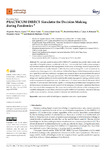Mostrar o rexistro simple do ítem
PRACTICUM DIRECT Simulator for Decision Making during Pandemics
| dc.contributor.author | Puente-Castro, Alejandro | |
| dc.contributor.author | Galdo, Brais | |
| dc.contributor.author | Said-Criado, Ismael | |
| dc.contributor.author | Baltar Boileve, David | |
| dc.contributor.author | Rabuñal, Juan R. | |
| dc.contributor.author | Pazos, A. | |
| dc.contributor.author | Martínez Pillado, Modesto | |
| dc.date.accessioned | 2022-01-03T13:14:09Z | |
| dc.date.available | 2022-01-03T13:14:09Z | |
| dc.date.issued | 2021 | |
| dc.identifier.citation | Puente-Castro, A.; Galdo, B.; Criado, I.S.; Boileve, D.B.; Rabuñal, J.R.; Pazos, A.; Martínez-Pillado, M. PRACTICUM DIRECT Simulator for Decision Making during Pandemics. Eng. Proc. 2021, 7, 48. https://doi.org/10.3390/engproc2021007048 | es_ES |
| dc.identifier.uri | http://hdl.handle.net/2183/29302 | |
| dc.description | Presented at the 4th XoveTIC Conference, A Coruña, Spain, 7–8 October 2021 | es_ES |
| dc.description.abstract | [Abstract] The past and current situation of the SARS-CoV-2 pandemic has put the entire society, and especially all hospital systems, worldwide to the test. It is essential that health system managers and decision makers optimize the management of resources, even being forced to improvise new units, divert resources usually destined to other functions and/or change the usual care modality by considerably enhancing aspects of telemedicine. Artificial Intelligence (AI) techniques and procedures are of great help in decision making in emergency environments due to severe pandemics because of their predictive capacity. This paper presents the PRACTICUM DIRECT project, which proposes the design and implementation of a tool to assist health system managers in making decisions on the early management of hospital resources. It makes use of AI techniques to identify the most critical variables in each case and build models capable of showing the possibilities and consequences of the decisions taken on resources at each moment of the emergency. It includes a simulator that shows how they would affect management. The current status is that of the selection of the most appropriate variables, taking into account those affected during the SARS-CoV-2 pandemic: infectious diseases, cardio-neuro-circulatory diseases, metabolic diseases and rehabilitative medicine. | es_ES |
| dc.description.sponsorship | This research was funded by the General Directorate of Culture, Education and University Management of Xunta de Galicia “PRACTICUM DIRECT” Ref. IN845D-2020/03 and the GRANT FOR THE PROGRAM FOR CONSOLIDATION AND STRUCTURING OF COMPETITIVE RESEARCH UNITS Ref. ED431C 2018/49 | es_ES |
| dc.description.sponsorship | Xunta de Galicia; IN845D-2020/03 | es_ES |
| dc.description.sponsorship | Xunta de Galicia; ED431C 2018/49 | |
| dc.language.iso | eng | es_ES |
| dc.publisher | MDPI | es_ES |
| dc.relation.uri | https://doi.org/10.3390/engproc2021007048 | es_ES |
| dc.rights | Atribución 4.0 Internacional | es_ES |
| dc.rights.uri | http://creativecommons.org/licenses/by/4.0/ | * |
| dc.subject | Pandemics | es_ES |
| dc.subject | Artificial intelligence | es_ES |
| dc.subject | Simulator | es_ES |
| dc.subject | Resources | es_ES |
| dc.subject | Expert system | es_ES |
| dc.title | PRACTICUM DIRECT Simulator for Decision Making during Pandemics | es_ES |
| dc.type | info:eu-repo/semantics/conferenceObject | es_ES |
| dc.rights.access | info:eu-repo/semantics/openAccess | es_ES |
| UDC.journalTitle | Engineering Proceedings | es_ES |
| UDC.volume | 7 | es_ES |
| UDC.issue | 1 | es_ES |
| UDC.startPage | 48 | es_ES |
| dc.identifier.doi | 10.3390/engproc2021007048 | |
| UDC.conferenceTitle | 4th XoveTIC Conference | es_ES |






